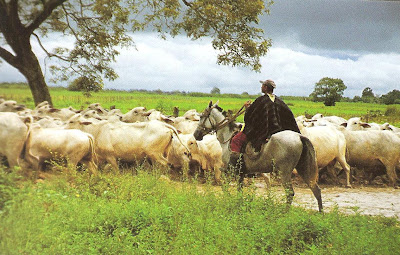Until recently, Los Llanos has had little impact by
humans. This is because the indigenous
who lived there did not do much to harm the ecosystem. The most impactful thing was hunting, but
even then it did not put a strain on any species. During colonialism there was more disturbances
due to hunting for feathers and leather.
Then the region began to be more populated by people, and there was an
increase in cattle ranching due to the perfect ranching terrain. Up to today, 71% of all South American
savannas have been converted to cropland and only 5% to urban areas. Thus, for Los Llanos urbanization in not an
issue.
Cattle ranching are a big part of the economy in los Llanos,
yet it is also the most damaging to the ecosystem. There are currently 15million cattle in los
Llanos, and to accommodate this large number pasture lands are being increased
and replacing the savannas. Another
increase has been in the farming industry, mostly in maize and rice. Not only is this causing more savanna loss,
but it is also causing an endangerment of various bird species. This is because the rice fields attract many
migrant flocks of birds who damage most of the crop, and so the farmers are
killing the birds.

Original image can be found at: http://http://cuentaelabuelo.blogspot.com/2011_06_01_archive.html
Another negative impact is caused by deforestation and
farming for the wood industry. In the
llanos in Venezuela the deforestation rate since 1975 has been 34,000
ha/year. From 1950 to 1975 a total of
1.3million ha were deforested in the llanos of Western Venezuela, which
includes Apure. It also seems that Los
Llanos has been in a state of siege by the oil industry. A total of 3million ha of savanna has been
affected by the oil industry, and that is only in the Venezuelan side of Los
Llanos. However, it has not developed
quite as much yet in the Columbian llanos but it is a looming threat. The oil industry causes damages in many
ways. The roads they build fragments
habitats, they bring a risk of soil and water contamination, and also with them
comes more human settlements which leads to more deforestation.
Original picture can be found at: http://www.caracol.com.co/noticias/economia/pacific-rubiales-reporta-nuevo-descubrimiento-de-petroleo-en-los-llanos-orientales/20091027/nota/900733.aspx
No comments:
Post a Comment